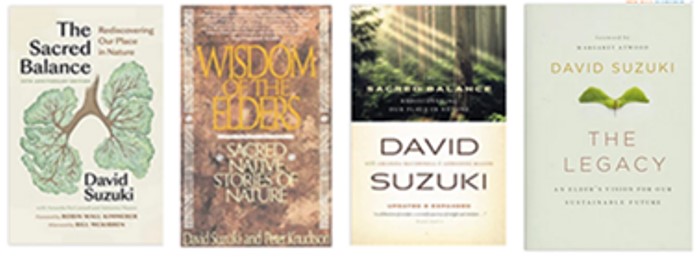Dr. David Suzuki’s Urgent Warnings To Humanity Now
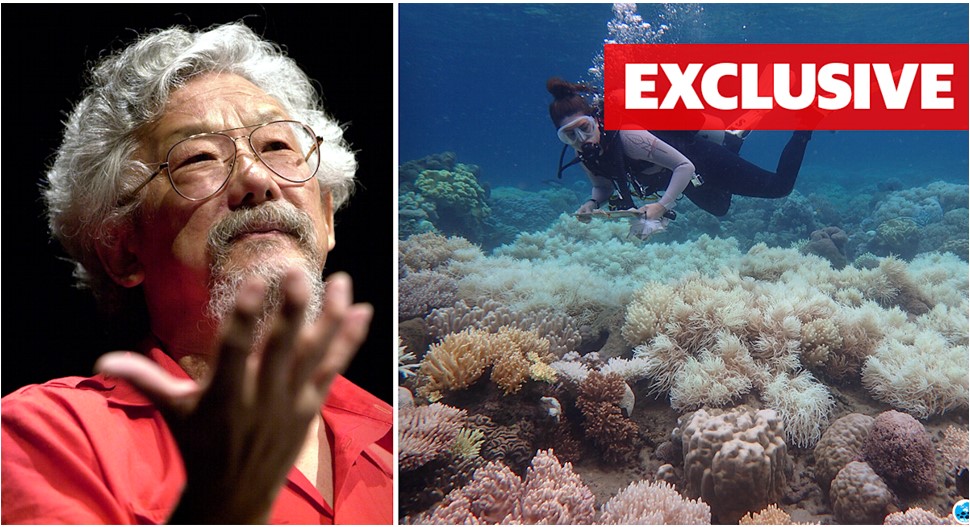 By Neenah Payne
By Neenah Payne
How Can We Stop The Sixth Mass Extinction? features the video David Suzuki Witnesses the Unraveling. Dr. David Suzuki is an internationally renowned Canadian geneticist, environmentalist, author of more than 52 books, and the founder of the David Suzuki Foundation. The godfather of the environmental movement in Canada, Dr. Suzuki was ranked greatest living Canadian in a 2005 poll. The videos below with Dr. Suzuki are must-see wake-up calls for humanity!
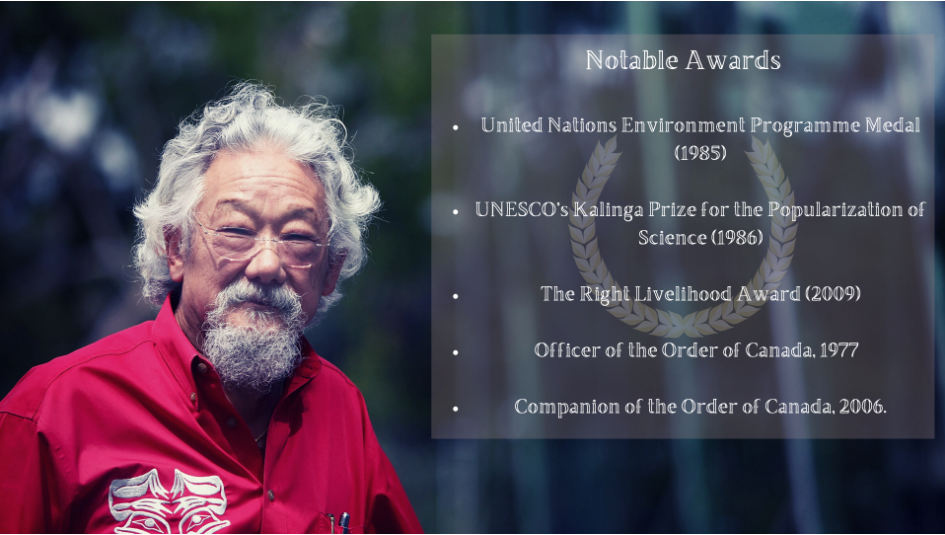
Knowing David Suzuki, the famous environmental activist, on his Birth-Anniversary
Fascinating Film
Force of Nature: The David Suzuki Movie 2010
David Suzuki, iconic Canadian scientist, activist, environmentalist, broadcaster and educator, delivers a last lecture — what he describes as a distillation of my life and thoughts, my legacy, what I want to say before I die. In his lecture he articulates a core, urgent message: we have exhausted the limits of the biosphere and it is imperative that we rethink our relationship with the natural world. The lecture itself is conceived as a memory box, where ideas, powerful images and his urgent message are delivered as a stunning theatrical event, captured by multiple cameras.
Dr. Suzuki, iconic Canadian scientist, educator, broadcaster, and activist, delivers what he describes as a distillation of his life and thoughts — his legacy. Filmed before a live audience in front of a memory box of moving, distilled images, the film interweaves the lecture with scenes from the places and events in Dr. Suzuki’s life. As such, it is a biography of ideas forged by the major social, scientific, cultural, and political events of the past several decades.
Dr. Suzuki articulates a core, urgent message: we have exhausted the limits of the biosphere and it is imperative that we re-think our relationship with the natural world. He looks unflinchingly at the strains on our interconnected web of life. He points out that we are driving 50 thousand species into extinction every year! Yet, out of our dire circumstances, he offers a blueprint for sustainability and survival.
NY Times Review: Dear Humans: The Planet Needs Your Help
By Stephen Holden Dec. 1, 2011
Sturla Gunnarsson’s “Force of Nature: The David Suzuki Movie” is constructed around a speech that its Japanese-Canadian subject — an engaging, erudite scientist, educator, broadcaster and eco-activist — calls his “legacy lecture.” The talk, given in Vancouver last December, is a dire warning delivered in a reasonable, friendly voice about the imminent destruction of the biosphere that sustains humankind. Dr. Suzuki’s upbeat tone is the spoonful of sugar that makes the bitter medicine go down.
Interwoven with the lecture is a fragmentary autobiography, which includes some painful early chapters about Dr. Suzuki’s relocation as a child to an internment camp during World War II. “Pearl Harbor and its repercussions are the defining events in my life,” he says. Later he participated in the civil rights movement and became the host of “The Nature of Things,” a CBC show in which he showed his talent for translating scientific jargon into layman’s language.
At heart Dr. Suzuki, 75, is a wise old hippie who truly cares about the planet and the future of the species and seems to believe, despite his words, that we still have time to save ourselves if we act immediately. But how, he doesn’t say. The Haida, an indigenous people on the Pacific Northwest coast who have stood up against the logging industry and with whom Dr. Suzuki is shown interacting, represent his ideal of how to live in harmony with nature. “We fail to ask the important questions: How much is enough? Are there no limits?” he declares. “One species — us — is single-handedly altering the planet. We have become a force of nature.
Why it’s time to think about human extinction | Dr David Suzuki
After listening to this ep with Dr. David Suzuki, you’ll never be the same again. The environmentalist, activist, professor of genetics, and science broadcaster hits us with some home truths about what our future will look like if we continue to live the way we have been.
What will life be like for our children and grandchildren? Can the damage we’ve done to the planet be reversed? Is extinction of the human race imminent? We talk about population control, the importance of renewable energy, and discuss what we can do right now in our own lives that can actually make a difference.
This is for anyone who cares about the future of mankind.
The Haida Nation
Dr. Suzuki first became aware of the worldview of the world’s indigenous peoples when he was asked to film a story in 1970 about the fight over logging in the territory of the Haida Gwaii nation, an archipelago of about 150 islands off the coast of British Columbia. The islands form the heartland of the Haida Nation, where people have lived for over 13,000 years and who make up about half the population.
The Haida exercise sovereignty over the islands through the Council of the Haida Nation. Part of the Canadian province of British Columbia, the islands were known from 1787 until 2010 as the Queen Charlotte Islands. As part of the Reconciliation between British Columbia and the Haida people, the Haida Gwaii Reconciliation Act renamed the archipelago on June 3, 2010.
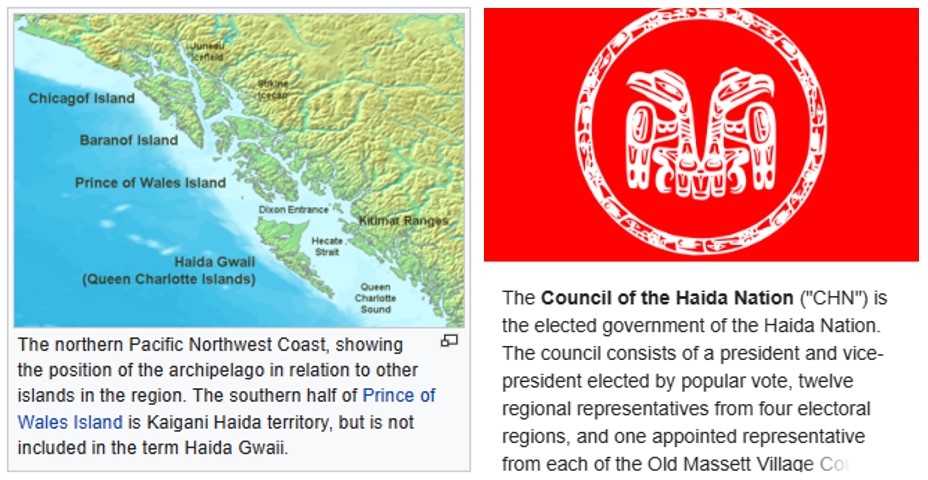
At the time of European contact in 1774, the population was about 30,000 people. It is estimated that 90% of the population died during the 1800s from smallpox alone. The 1862 Pacific Northwest smallpox epidemic alone killed over 70% of the Haida people. The Europeans also brought typhoid, measles, and syphilis.
By 1900, only 350 people remained. Towns were abandoned as people left their homes for the towns of Skidegate and Masset, for cannery towns on the mainland, or for Vancouver Island. Today, around 4,500 people live on the islands. About 70% of the indigenous people (Haida) live in two communities with a population of about 700 each. The Haida make up 45% of the population of the islands.
Populations that formerly inhabited Beringia expanded into northern North America after the Last Glacial Maximum and gave rise to Eskimo-Aleuts and Na-Dené Indians.
The Haida developed a culture made rich by the abundance of the land and sea. The Haida are a linguistically-distinct group. They have a complex class and rank system consisting of two main clans, Eagles and Ravens. Links within the Haida Nation were gained through a marriage system between the clans. This system was also important for the transfer of wealth with each clan reliant on the other for building longhouses and carving totem poles and other items of cultural importance. Noted seafarers, the Haida occupied more than 100 villages throughout the Islands. The Haida were skilled traders, with established trade links with their neighboring First Nations on the mainland to California
On December 11, 2009, the British Columbia government announced that legislation would be introduced in mid-2010 to officially rename the Queen Charlotte Islands to the new name “Haida Gwaii. The legislation received royal assent on June 3, 2010, formalizing the name change.
At an official Giving Back the Name ceremony, the name, written on a piece of paper and placed in a bentwood box, was handed to the premier of British Columbia. This name change is officially recognized by all levels of Canadian governments, and by the United States’ National Geospatial-Intelligence Agency name database. The name Haida Gwaii was created in the 1980s as an alternative to the colonial-era name “Queen Charlotte Islands” to recognize the history of the Haida people. Haida means “us” and “people”. “Haida Gwaii” means “islands of the people”.
Haida Gwaii has been featured in The Nature of Things documentaries since the 1970s due to its unique forest and ecosystem. Many wildlife and adventure tourism TV series (in the US and Canada) have also featured the islands since the 1990s, reflecting the islands as a globe trekking location. Haida Gwaii and its people are the subject of the documentary Haida Gwaii: On the Edge of the World. Masters of the Northwest, a two-hour documentary mainly featuring Haida Gwaii was broadcast by the Ontario educational TV network in 2017.
Edge of the Knife (SG̲aawaay Ḵ’uuna), the first feature film made in the Haida language, was shot on Haida Gwaii in 2017. The slideshow below is an orientation to Haida Gwaii culture and history. Click the circles on any slide to display more information.
Click here to download the PDF version of the Haida Gwaii Visitor Orientation.
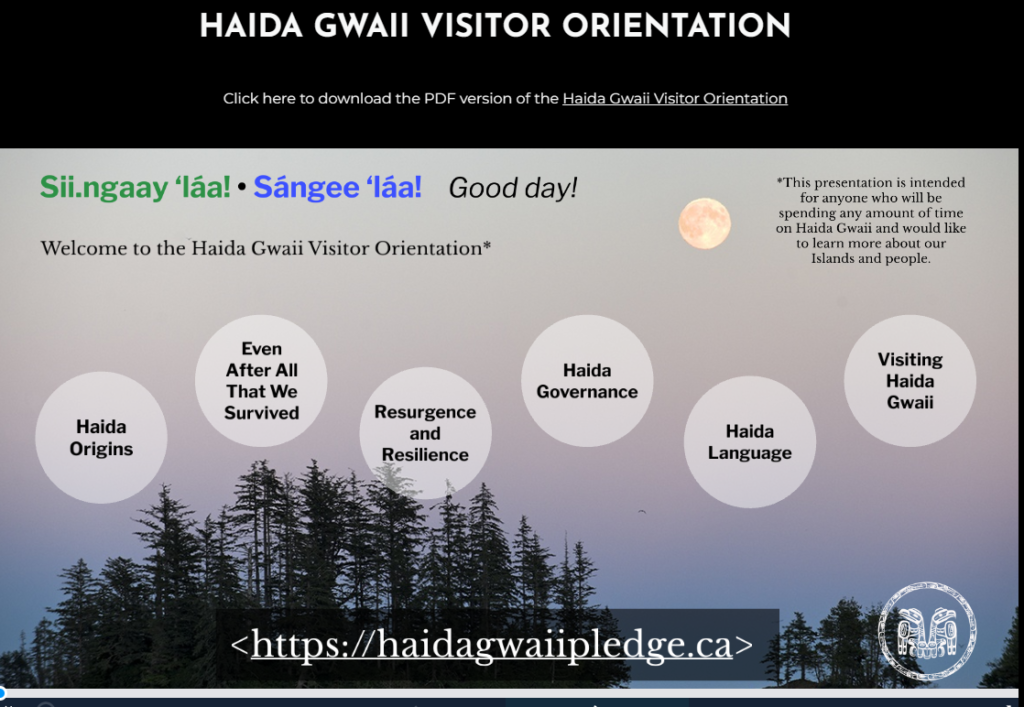
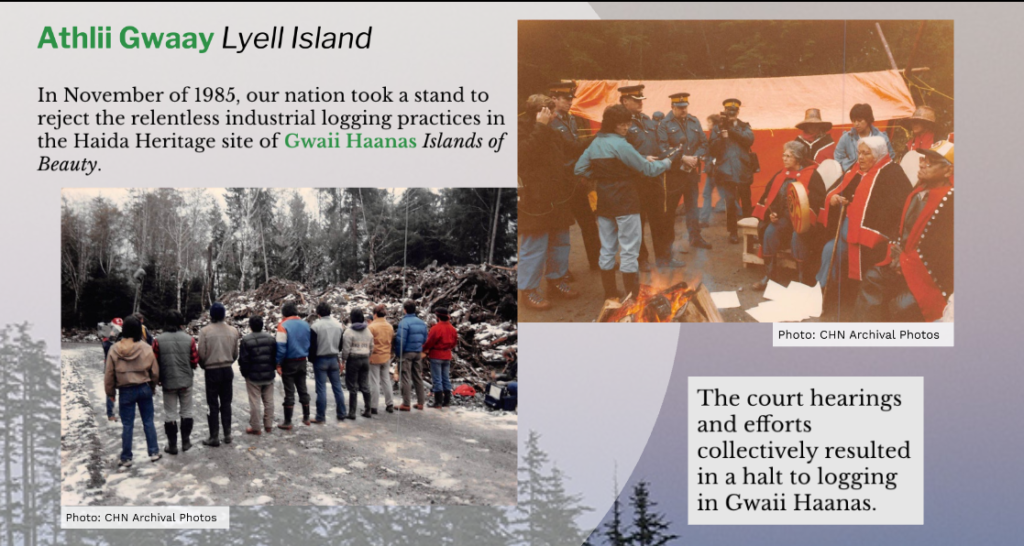
In the 1987 film Wall Street, Gordon Gecko, played by Michael Douglas, told us “Greed is good”. However, in the Potlach of the Haida, people gain prestige by how much they give away. Haida people are esteemed for their generosity, not for hoarding wealth. The potlatch ceremony marks important occasions including marriage, naming children, and mourning the dead.
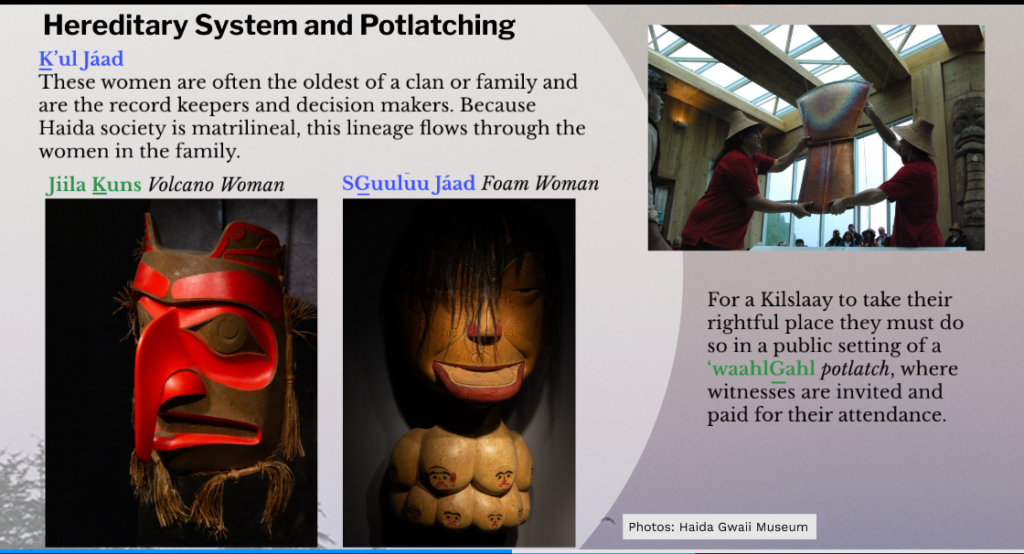
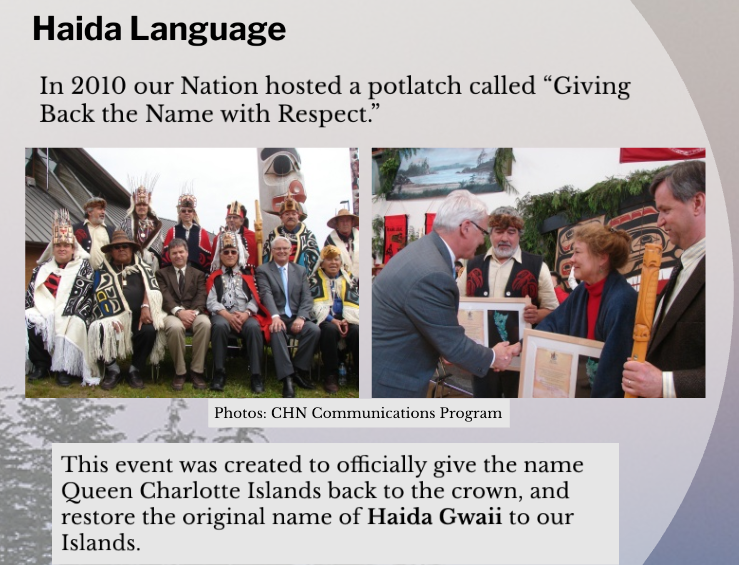
Dr. Suzuki often wears the symbol of the Raven (Nang Kilslas) who taught the Haida many lessons they obey. It similar to The Original Instructions Native Americans follow discussed further below.
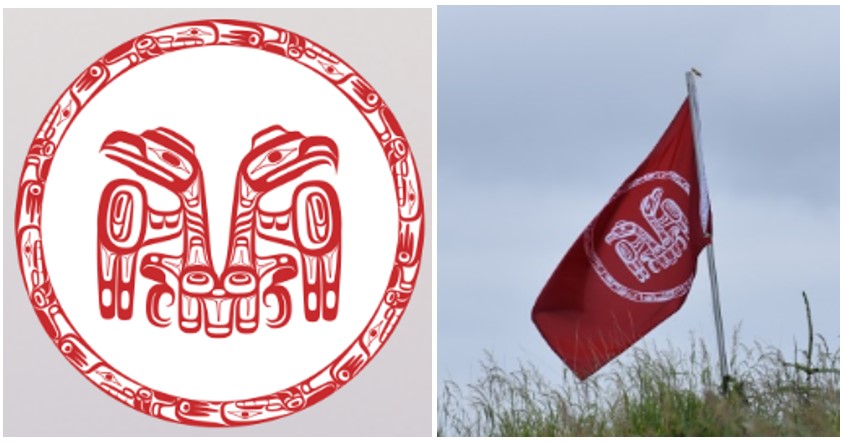
David Suzuki – Restoring Life’s Fabric | Bioneer
Is the economy the most important thing? Canadian geneticist, author, and television producer David Suzuki says the economy is just a subset of ecology. Drawing on native wisdom and state-of-the-art science, he vividly demonstrates that what we do to what surrounds us, we do to ourselves, and suggests how to restore the fabric of the biosphere. This speech was presented at the 2003 Bioneers National Conference and is part of the Protecting and Restoring Nature Collection, Vol. 1.
Dr. Suzuki’s Daughter: Severn Cullis-Suzuki
Dr. Suzuki’s daughter Severn Cullis-Suzuki is an environmental and cultural activist, speaker, and author. Severn was named the Executive Director of The David Suzuki Foundation in 2021.
At Issue: Severn Cullis-Suzuki Is Back and Ready to Fight
By Nathan Caddell / April 1, 2022
Severn Cullis-Suzuki, Environmentalist & activist
Severn Cullis-Suzuki is an environmentalist, activist and founding member of the David Suzuki Foundation. She shares her Earth Day message from Haida Gwaii, an archipelago in British Columbia. The world needs you–and your actions!–on Earth Day and every day. What steps are you taking to reduce your carbon footprint?
Severn lived on Haida Gwaii, for 14 years until 2020. She worked on revitalization of the Haida language, the heritage language of her husband Gudt’aawtis Judson Brown and their two children.
Severn’s husband is the Marine Planning Program Manager for the Council of the Haida Nation (CHN).
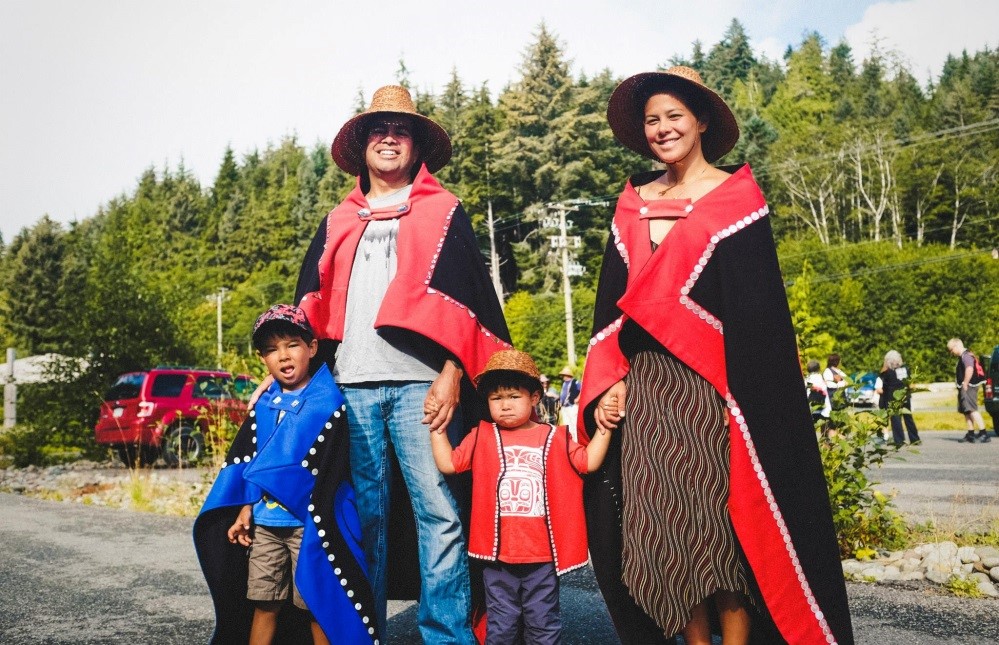 Page through Haida Marine Planning shown below.
Page through Haida Marine Planning shown below.
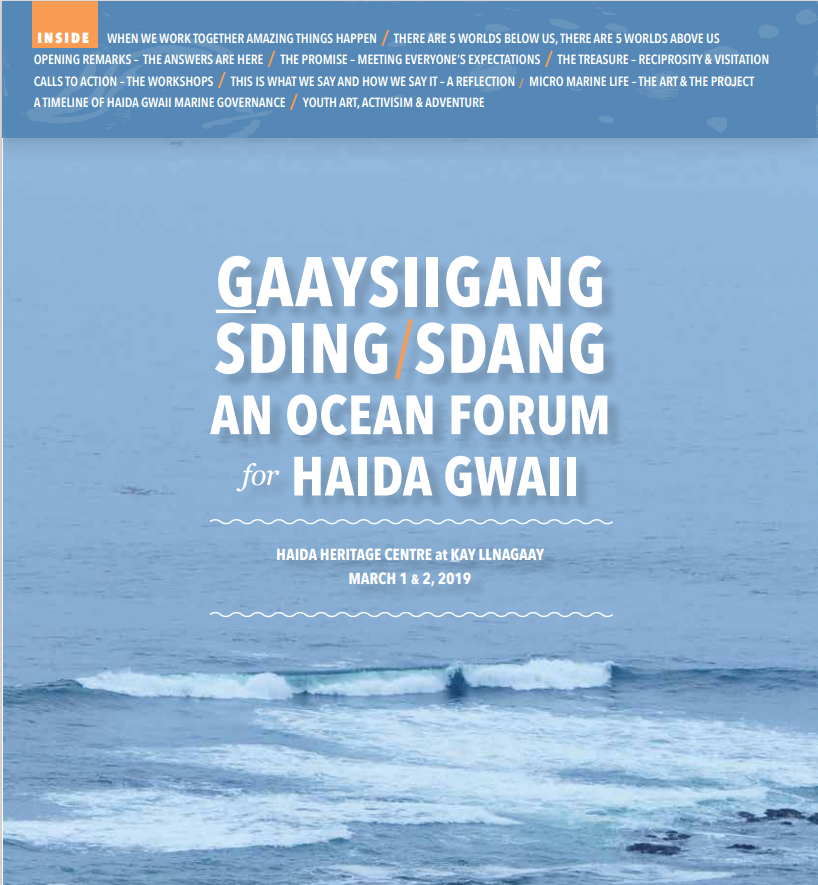
“Time is Running Out: Ecology or Economics?” – David Suzuki
Environmentalist and activist David Suzuki gave a lecture titled “Time is Running Out: Ecology or Economics?” at Western Washington University. Suzuki is best known for his work as a radio and television host dealing with natural sciences in an easy to understand way, and has won numerous awards throughout his career in broadcasting. He has also received 25 honorary degrees from institutions in the United States, Canada, and Australia and written 52 books, 19 of which are children’s books. He also a co-author of “An Introduction to Genetic Analysis,” one of the most widely used textbooks on Genetics in the United States. Suzuki graduated from Amherst College with a bachelor’s degree in Biology and received his doctorate in Zoology from the University of Chicago in 1961. He is currently a professor emeritus at the University of British Columbia in Vancouver, B.C.
Dr. Suzuki recommended The End of Growth by Jeff Rubin
Amazon Description
In an urgent follow-up to his best-selling Why Your World Is About To Get A Whole Lot Smaller, Jeff Rubin argues that the end of cheap oil means the end of growth. What it will be like to live in a world where growth is over? Economist and resource analyst Jeff Rubin is certain that the world’s governments are getting it wrong. Instead of moving us toward economic recovery, measures being taken around the globe right now are digging us into a deeper hole. Both politicians and economists are missing the fact that the real engine of economic growth has always been cheap, abundant fuel and resources. But that era is over. The end of cheap oil, Rubin argues, signals the end of growth–and the end of easy answers to renewing prosperity.
Rubin’s own equation is clear: with China and India sucking up the lion’s share of the world’s ever more limited resources, the rest of us will have to make do with less. But is this all bad? Can less actually be more? Rubin points out that there is no research to show that people living in countries with hard-charging economies are happier, and plenty of research to show that some of the most contented people on the planet live in places with no-growth or slow-growth GDPs. But it doesn’t matter whether it’s bad or good, it’s the new reality: our world is not only about to get smaller, our day-to-day lives are about to be a whole lot different.
In his final stretch, the world’s most famous environmentalist is beset by doubts and doubters.
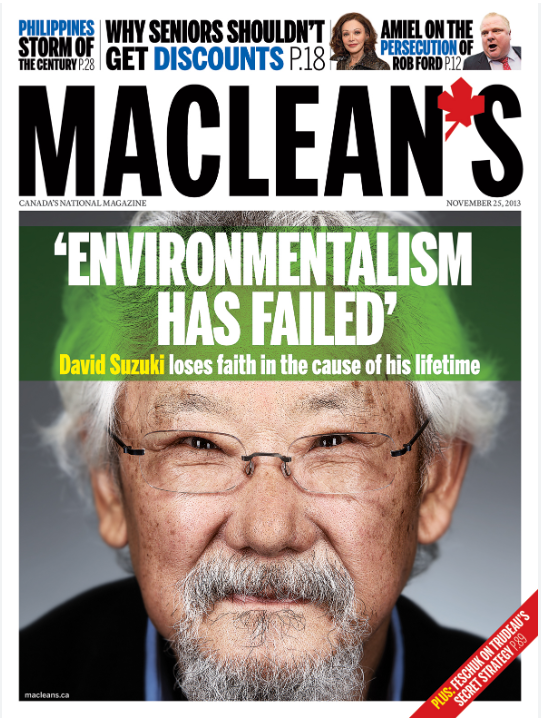
David Suzuki – On Being Part of Nature
Dr. David Suzuki, the revered scientist, broadcaster and activist whose 52 books and decades of TV and radio service have made him the most respected and powerful figure in Canadian environmentalism. David Suzuki is a legendary environmental champion. As a geneticist, author, broadcaster and teacher, Suzuki has been interpreting and defending nature to viewers and audiences in Canada—and the world—for more than 40 years. He has written 52 books, including 15 for children, and his television show, The Nature of Things, is seen in more than 40 countries.
In 2005, in a Canadian Broadcasting Corporation poll to determine the “greatest Canadian who ever lived,” he was ranked 5th, which made him the greatest living Canadian. — This interview is part of The Green Interview, an archive of resources pertinent to an understanding of the future of life on earth and humanity’s roles and responsibilities in sustaining it. The archive was produced by the late Silver Donald Cameron and Chris Beckett during the 10 years before Cameron’s death in 2020.
Dr. Suzuki is the author of 52 books, including:
Wisdom of the Elders: Sacred Native Stories of Nature
The Sacred Balance: Rediscovering Our Place in Nature
The Legacy: An Elder’s Vision for Our Sustainable Future
The Sacred Balance, 25th anniversary edition: Rediscovering Our Place in Nature
Can Native American Wisdom Help Save Humanity Now?
Dr. Suzuki says that in the 1970s, there was a battle over logging in the Queen’s Charlotte Islands, now called Haida Gwaii (Islands of the Haida People). When he was asked to do a film about the confrontation, he wrote the book Wisdom of the Elders: Sacred Native Stories of Nature to show that indigenous perspectives all over the world are validated by the best science.
Canada has a Truth and Reconciliation Commission to facilitate the relationship with the First Nations peoples of Canada. See Final Report of the Truth and Reconciliation Commission of Canada, Volume One: Summary: Honouring the Truth, Reconciling for the Future. Australia and South Africa have similar commissions.
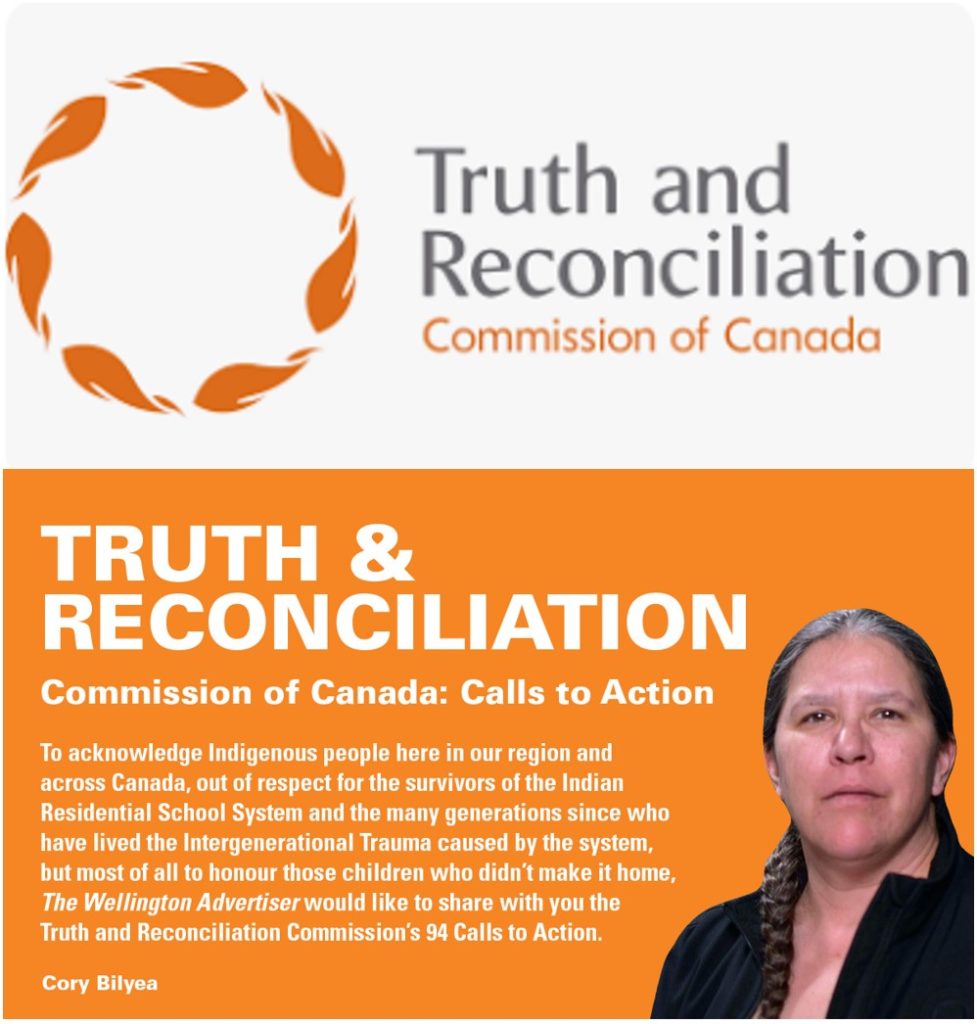
US Truth and Reconciliation Commission
Mark Charles would like to establish a Truth and Conciliation Commission in the US. He doesn’t like the term “reconciliation” because it implies a previous harmony. Charles is the co-author of Unsettling Truths – The Ongoing, Dehumanizing Legacy of the Doctrine of Discovery.
See Growing Calls To Repudiate “Doctrine of Discovery”.
Collaborating now with Native America and adopting the values of the world’s indigenous peoples is the only way for humanity to survive now.
Advice to Young People as they face Annihilation | Roger Hallam
‘Heading for Extinction’ – Oxford Extinction Rebellion talk with George Monbiot and friends.
Native America Leadership
My Articles About Native America in my Urban Gardens Revolutions site shows that a growing number of Native Americans are stepping forward now to help guide humanity from the brink. We just have to be wise enough now to listen and learn to follow.
Native American cultures have held onto the “Original Instructions” on how to live on Earth. See Original Instructions: Indigenous Teachings for a Sustainable Future. For that reason, they have been a “keystone species” for thousands of years — protecting the soil, water, plants, and animals for the next seven generations. This worldview and connectedness to the Earth provides people with a sense of purpose, identity, and collaboration. Native Americans held onto the ancient wisdom the West lost during the Inquisition, Enlightenment, and Industrial Revolution which is needed now to guide us from the brink of destruction.
This series of articles will be updated periodically because so many Native American authors, professors, lawyers, scientists, etc. are guiding the world back to sanity now. This kind of healing wisdom is no longer found now outside indigenous cultures.
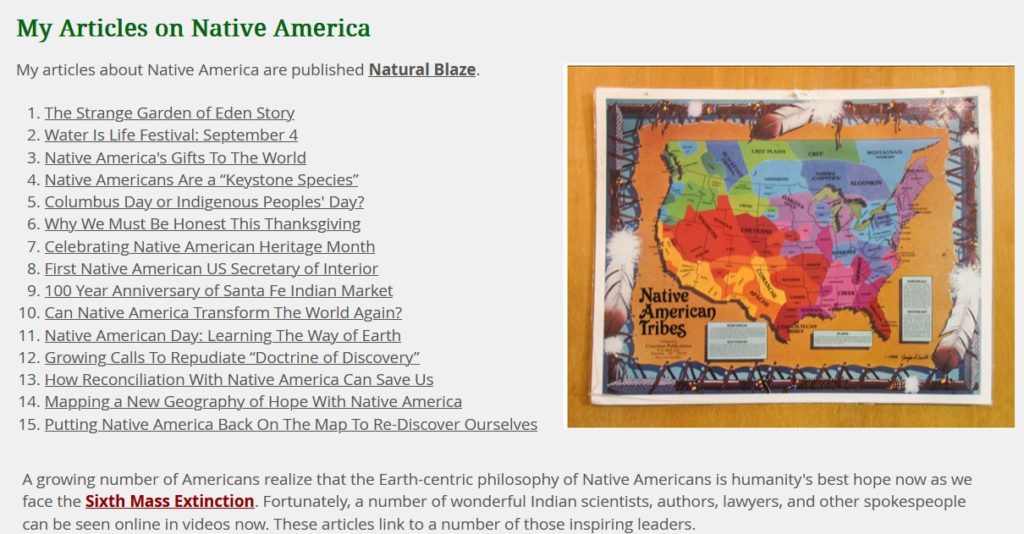
Neenah Payne writes for Activist Post and Natural Blaze
Top image caption and credit: David Suzuki warns the fate of the Great Barrier Reef hangs in the balance. Source: AAP





